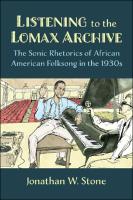Listening to the Lomax Archive
External Review of Whole Manuscript
The Sonic Rhetorics of African American Folksong in the 1930s
Abstract
In 1933, John A. Lomax and his son Alan set out as emissaries for the Library of Congress to record the folksong of the “American Negro” in several southern African American prisons. Listening to the Lomax Archive: The Sonic Rhetorics of African American Folksong in the 1930s asks how the Lomaxes’ field recordings—including their prison recordings and a long-form oral history of jazz musician Jelly Roll Morton—contributed to a new mythology of Americana for a nation in the midst of financial, social, and identity crises. Stone argues that folksongs communicate complex historical experiences in a seemingly simple package, and can thus be a key element—a sonic rhetoric—for interpreting the ebb and flow of cultural ideals within contemporary historical moments. He contends that the Lomaxes, aware of the power of folk music, used the folksongs they collected to increase national understanding of and agency for the subjects of their recordings even as they used the recordings to advance their own careers. Listening to the Lomax Archive gives readers the opportunity to listen in on these seemingly contradictory dualities, demonstrating that they are crucial to the ways that we remember and write about the subjects of the Lomaxes’ archive and other repositories of historicized sound. Throughout Listening to the Lomax Archive, there are a number of audio resources for readers to listen to, including songs, oral histories, and radio program excerpts. Each resource is marked with a ? in the text. Visit https://doi.org/10.3998/mpub.9871097#resources to access this audio content.
Keywords
rhetoric; sonic rhetoric; sonic rhetorics; folksong; Lead Belly; Jelly Roll Morton; sound studies; historioDOI
10.3998/mpub.9871097ISBN
9780472902446, 9780472038558, 9780472902446Publisher
University of Michigan PressPublisher website
https://www.press.umich.edu/Publication date and place
2021Imprint
University of Michigan PressClassification
Music
Theory of music and musicology


 Download
Download Web Shop
Web Shop